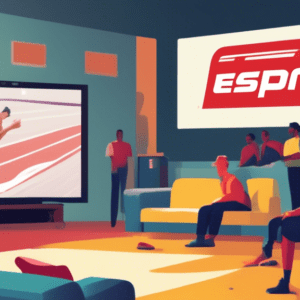ESPN and Dwight Stones Criticized for Lackluster Track and Field Championship Coverage
The World Athletics Championships, track and field’s biggest stage outside the Olympics, unfolded with exhilarating performances and historic achievements. However, a dark cloud hung over the otherwise captivating competition—the subpar broadcasting quality of ESPN, exacerbated by commentator Dwight Stones’ controversial remarks.
A History of Discontent: Track and Field Fans Voice Frustration
This isn’t the first time ESPN has drawn the ire of track and field enthusiasts. For years, fans have expressed their disappointment over the network’s seeming lack of respect for the sport, often relegating it to ESPN+, its streaming platform, and offering limited live coverage during primetime hours. The result? Many captivating races and events go unnoticed by a wider audience.
Social media platforms like Twitter became digital arenas where fans vented their frustration, with #ESPN trending alongside keywords like disrespectful and unwatchable. The sentiment was clear: track and field, despite its global appeal and rich history, wasn’t receiving the coverage it deserved from one of the world’s leading sports broadcasters.
Dwight Stones Under Fire: Controversial Commentary Reignites Debate
Adding fuel to the fire was the commentary of Dwight Stones, a former Olympic medalist turned broadcaster. While Stones possesses an undeniable knowledge of the sport, his delivery style and often opinionated remarks have drawn criticism from viewers. Some viewers found his commentary to be lacking in enthusiasm and insight, failing to capture the excitement of the events unfolding on the track.
However, it was Stones’ remarks about Nigerian sprinter Tobi Amusan, the reigning world record holder in the 100m hurdles, that sparked the most outrage. During the event’s final, Stones appeared to question the accuracy of the timing system after Amusan posted an astonishing time in the semifinals. Although he later walked back his comments, the damage was done. Fans accused him of bias and disrespect, accusing him of undermining the achievements of athletes, particularly those of African descent.
The Bigger Picture: Is ESPN Failing Track and Field?
The controversy surrounding ESPN’s coverage and Stones’ commentary points to a larger issue—the challenges faced by track and field in attracting and retaining viewership, particularly in the United States. While the sport enjoys immense popularity in other parts of the world, it struggles to break through in a crowded American sports market dominated by football, basketball, and baseball.
Critics argue that ESPN, with its vast resources and reach, has a responsibility to elevate the sport, not just relegate it to the periphery. By providing comprehensive coverage, showcasing its stars, and fostering knowledgeable and engaging commentary, ESPN could play a pivotal role in expanding track and field’s fanbase and appreciation.
A Call for Change: Fans Demand Better From Broadcasters
The outcry over ESPN’s coverage isn’t merely about one commentator’s remarks or a single championship event. It’s about respect for a sport rich in history, diversity, and captivating competition. Fans are demanding better—better coverage, better commentary, and a genuine commitment to showcasing track and field in all its glory.
Whether ESPN heeds these calls for change remains to be seen. However, one thing is clear: the passion for track and field burns bright, and fans will continue to demand the high-quality broadcasting that the sport, and its athletes, deserve.
The Need for Investment and Innovation: Securing the Future of Track and Field Broadcasting
Beyond criticism, there lies an opportunity. ESPN, and indeed the entire broadcasting landscape, should view this as a chance to reassess their approach to track and field. Investing in modern broadcasting technologies, such as enhanced camera angles, augmented reality overlays, and athlete tracking data, can provide a more immersive and engaging viewing experience.
Furthermore, fostering a new generation of commentators who possess both deep knowledge and charisma can breathe fresh life into the broadcast booth. Highlighting the athletes’ personal stories, their journeys to the top, and the challenges they’ve overcome can create a stronger emotional connection with the audience.
Embracing the Digital Age: Reaching New Audiences Online
In today’s digital age, it’s not enough to rely solely on traditional television broadcasts. ESPN should leverage its digital platforms, including social media and streaming services, to create engaging content that appeals to a wider, and potentially younger, audience. Short-form documentaries, behind-the-scenes footage, and athlete profiles can help humanize the sport and make it more relatable.
Collaborating with track and field influencers, athletes who command large online followings, can also help expand the sport’s reach. These athletes can provide unique perspectives, share their training regimens, and offer insights into the competitive landscape, thereby engaging fans in new and exciting ways.
A Collective Responsibility: Working Towards a Brighter Future
The responsibility to improve track and field’s broadcasting landscape doesn’t rest solely on ESPN’s shoulders. Governing bodies, athletes, sponsors, and fans all have a role to play in raising the sport’s profile and demanding better coverage.
By working together, embracing innovation, and recognizing the sport’s universal appeal, track and field can secure its rightful place on the global stage. The raw athleticism, the inspiring stories, and the thrilling finishes deserve to be celebrated and shared with the world—and it all begins with compelling, insightful, and respectful broadcasting.
